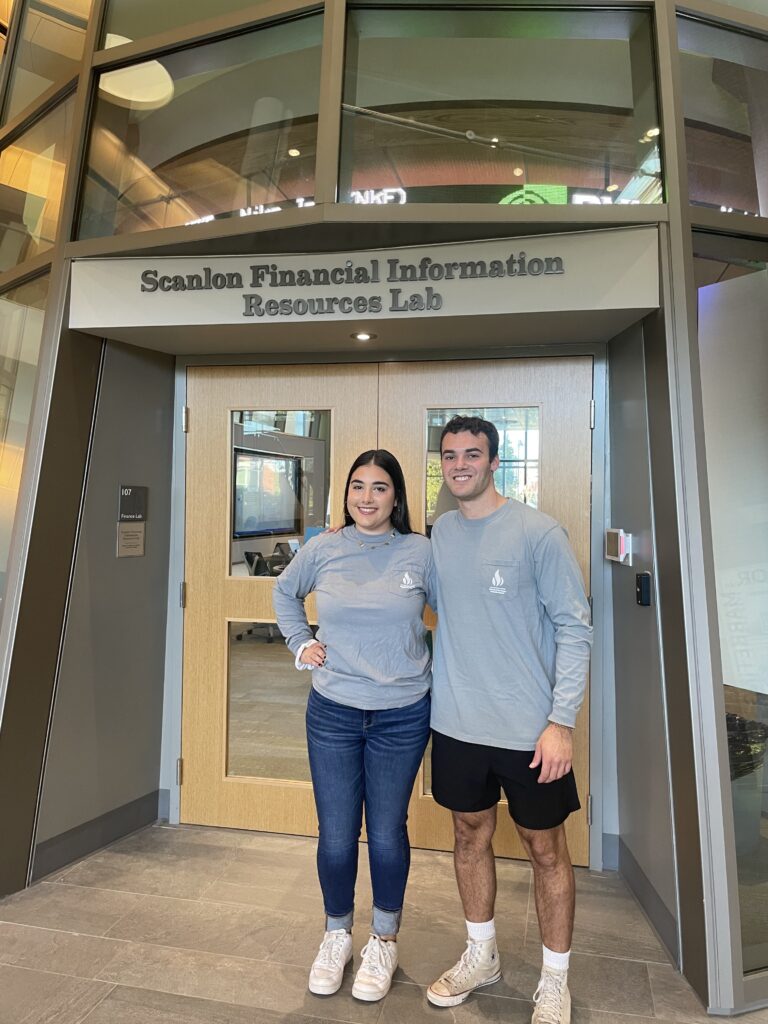Finance Students Reap the Benefits of a New Summer Experiential Learning Program

PCSB students kept busy this summer. Nearly 50 finance undergraduate students were given the opportunity to participate in a pilot program utilizing the renowned Wall Street Prep (WSP) platform. Wall Street Prep is a training provider used by the world’s top investment banks, private equity firms, Fortune 1000 companies, and business schools, including the Providence College School of Business.
Curated by Paul Scanlon, director of the finance resource lab, students participated in modules including an accounting crash course, an Excel crash course, where students learned to master Excel without a mouse, financial statement modeling, discounted cash flow modeling, and the ultimate guide to the technical finance interview. After the completion of each module, there’s an assessment, and upon passing that, students receive a credential from Wall Street Prep. Over the course of the summer, the pilot group averaged 20 hours and 30 minutes of learning on the platform.
Scanlon, who advocated for the PCSB to utilize the program, discussed why the School decided to use WSP. “The PCSB has a strong finance curriculum with many great professors. The PCSB curriculum delves into all of the areas we covered in WSP, but experiential learning — WSP in particular — provides an opportunity for students to go even farther into certain topic areas at their own pace and build upon those skills. Students also receive credentials from WSP that they can utilize on their resumes to signal their work on WSP to potential employers.”
Matthew Blair, director, university relations, at Wall Street Prep was impressed with the pilot. “When reviewing the data on usage from the summer, it was great to see PC students so engaged with the content, showing a higher average time spent in the system than many other schools. Students put in the time and effort during the summer months, even while working at their internships, holding other jobs, and traveling.” Summer is usually a time for students to recharge and relax, but Blair shared, “I’ve set up programs like this at other universities, mostly during the academic year, but I am impressed with the hard work and dedication of the PC students to complete the coursework during the summer. I’m looking forward to continuing to hear about the students’ success this upcoming academic year.”
The pilot was open to rising sophomores, juniors, and seniors. While sophomores faced the biggest challenges with the difficult coursework, that didn’t stop current sophomore Christina Savo from making the most of the experience. “Prior to starting at PC, I had limited exposure to the finance industry, except a personal finance class in high school. When Professor Scanlon presented the WSP opportunity, it seemed like a great chance for me to build my finance knowledge. I took advantage of this opportunity to expand my knowledge to learn what am I going to be doing in the finance field after I graduate.” Christina was the first student to complete the entire program and did so before the end of June.
Junior Alex Wheeler was eager to jump into Wall Street Prep this summer. Wheeler, who participated in the PCSB’s annual Wall Street Prep Interview Bootcamp, knew that if he wanted to land the best internships and jobs, he had to continually develop his finance knowledge base. “In Wall Street Prep, not only did I get to master what I’ve already learned in class, I got to learn about things we haven’t covered yet, and I found the ultimate guide to the technical finance interview very helpful.” Wheeler, who also interned at RBC Wealth Management this summer, completed the second most hours in WSP, reaching an impressive 67 hours. Wheeler will continue to utilize the program throughout the year to explore the many other modules available.
He reflected on having access to a learning tool used by some of the most prominent firms in the world. “I knew this was a limited pilot, so I didn’t want to miss out. I felt this would give me an edge as I begin my job search.” Going on further he shared, “I knew I needed to strengthen my skills to get the upper hand, and I felt that WSP showed me what I’ll be doing as a professional.”
“I was really pleased with the amount of time and effort the students put in,” Scanlon reflected. “The PCSB students that were in this program had already put in a lot of work during the school year. For context, they finished up classes, took exams, went home, started jobs and internships, and then started receiving e-mails from me about the Program’s June 1st kick-off. There was no pushback, no complaining. Most of them just went to work. Over the summer I touched base with the group four times and connected with many of them individually, where they shared feedback on the program and shared their many accomplishments.”
The hope is that students will continue to utilize their WSP access throughout the year. “Calls with Paul [Scanlon] discussing the WSP pilot program throughout the spring and summer further confirmed that PC is a perfect university training partner,” Blair shared. “Overall, it was a great experience working with Paul and the students. I look forward to continuing the partnership.”
Students in the pilot program will hold their license through the end of this school year. They’ll be able to continue in the assigned modules and explore the robust training material that WSP has to offer.





